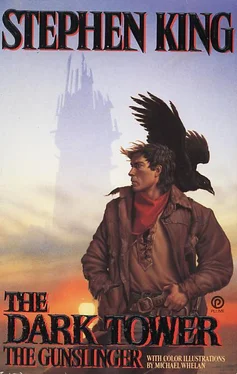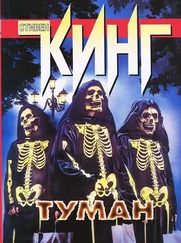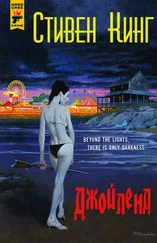in some instinctual way he strove not to be corrupted, knowing in his colder mind that such strife was vain and always would be.
It was noon. He looked up, letting the cloudy, unsettled daylight shine for the last time on the all-too-vulnerable sun of his own righteousness. No one ever really pays for it in silver, he thought. The price of any evil – necessary or otherwise – comes due in flesh.
“Come with me or stay,” the gunslinger said.
The boy only looked at him mutely. And to the gunslinger, in that final and vital moment of uncoupling from a moral principle, he ceased to be Jake and became only the boy, an impersonality to be moved and used.
Something screamed in the windy stillness; he and the boy both heard.
The gunslinger began, and after a moment Jake came after. Together they climbed the tumbled rock beside the steely-cold falls, and stood where the man in black had stood before them. And together they entered in where he had disappeared. The darkness swallowed them.
The gunslinger spoke slowly to Jake in the rising and falling inflections of a dream:
“There were three of us: Cuthbert, Jamie, and I. We weren’t supposed to be there, because none of us had passed from the time of children. If we had been caught, Cort would have striped us. But we weren’t. I don’t think any of the ones that went before us were caught, either. Boys must put on their fathers’ pants in private, strut them in front of the mirror, and then sneak them back on their hangers; it was like that. The father pretends he doesn't notice the new way they are hung up, or the traces of boot-polish mustaches still under their noses. Do you see?”
The boy said nothing. He had said nothing since they had relinquished the daylight. The gunslinger had talked hectically, feverishly, to fill his silence. He had not looked back at the lights as they passed into the lightlessness beneath the mountains, but the boy had. The gunslinger had read the failing of day in the soft mirror of Jake’s cheek:
Now faint rose; now milk-glass; now pallid silver; now the last dusk-glow touch of evening; now nothing. The gunslinger had struck a false light and they had gone on.
Now they were camped. No echo from the man in black returned to them. Perhaps he had stopped to rest, too. Or perhaps he floated onward and without running-lights, through nighted chambers.
“It was held once a year in the Great Hall,” the gunslinger went on. “We called it The Hall of Grandfathers. But it was only the Great Hall.”
The sound of dripping water came to their ears.
“A courting rite.” The gunslinger laughed deprecatingly, and the insensate walls made the sound into a loon-like wheeze. “In the old days, the books say, it was the welcoming of spring. But civilization, you know….
He trailed off, unable to describe the change inherent
in that mechanized noun, the death of the romantic and its sterile, carnal revenant, living only a forced respiration of glitter and ceremony; the geometric steps of courtship during the Easter-night dance at the Great Hall which had replaced the mad scribble of love which he could only intuit dimly – hollow grandeur in the place of mean and sweeping passions which might once have erased souls.
“They made something decadent out of it,” the gunslinger said. “A play. A game.” In his voice was all the unconscious distaste of the ascetic. His face, had there been stronger light to illumine it, would have shown change —harshness and sorrow. But his essential force had not been cut or diluted. The lack of imagination that still remained in that face was remarkable.
“But the Ball,” the gunslinger said. “The Ball. . .“
The boy did not speak.
“There were five crystal chandeliers, heavy glass with electric lights. It was all light, it was an island of light.
“We had sneaked into one of the old balconies, the ones that were supposed to be unsafe. But we were still boys. We were above everything, and we could look down on it I don’t remember that any of us said anything. We only looked, and we looked for hours.
“There was a great stone table where the gunslingers and their women sat, watching the dancers. A few of the gunslingers danced, but only a few. And they were the young ones. The other ones only sat, and it seemed to me they were half embarrassed in all that light, that civilized light. They were revered ones, the feared ones, the guardians, but they seemed like hostlers in that crowd of cavaliers with their soft women. . . .
“There were four circular tables loaded with food, and they turned all the time. The cooks’ boys never stopped coming and going from seven until three the next morning. The tables rotated like clocks, and we could smell roast pork, beef, lobster, chickens, baked apples. There were ices and candies. There were great flaming skewers of meat.
“And Marten sat next to my mother and father – I knew them even from so high above – and once she and Marten danced, slowly and revolvingly, and the others cleared the floor for them and clapped when it was over. The gunslingers did not clap, but my father stood slowly and held his hands out to her. And she went, smiling.
“It was a moment of passage, boy. A time such as must be at the Tower itself, when things come together and hold and make power in time. My father had taken control, had been acknowledged and singled out. Marten was the acknowledger; my father was the mover. And his wife my mother, went to him, the connection between them. Betrayer.
“My father was the last lord of light.”
The gunslinger looked down at his hands. The boy still said nothing. His face was only thoughtful.
“I remember how they danced,” the gunslinger said softly. “My mother and Marten the enchanter. I remember how they danced, revolving slowly together and apart, in the old steps of courtship.”
He looked at the boy, smiling. “But it meant nothing, you know. Because power had been passed in some way that none of them knew but all understood, and my mother was locked root and rind to the holder and wielder of that power. Was it not so? She went to him when the dance was over, didn’t she? And clasped his hand? Did they applaud? Did the hall ring with it as those pansy-boys and their soft ladies applauded and lauded him? Did it? Did it?”
Bitter water dripped distantly in the darkness. The boy said nothing.
“I remember how they danced,” the gunslinger said softly. “I remember how they danced. . . . “He looked up at the unseeable stone roof and it seemed for a moment that he might scream at it, rail at it, challenge it blindly – those dumb tonnages of insensible granite that bore their tiny lives in its stone intestine.
“What hand could have held the knife that did my father to his death?”
“I’m tired,” the boy said wistfully.
The gunslinger lapsed into silence, and the boy laid over and put one hand between his cheek and the stone. The little flame in front of them guttered. The gunslinger rolled a smoke. It seemed he could see the crystal light still, in the sardonic hall of his memory; hear the shout of accolade, empty in a husked land that stood even then hopeless against a gray ocean of time. The island of light hurt him bitterly, and he wished he had never held witness to it, or to his father’s cuckoldry.
He passed smoke between his mouth and nostrils, looking down at the boy. How we make large circles in earth for ourselves, he thought. How long before the daylight again?
He slept.
After the sound of his breathing had become long and steady and regular, the boy opened his eyes and looked at the gunslinger with an expression that was very much like love. The last light of the fire caught in one pupil for a moment and was drowned there. He went to sleep.
Читать дальше








